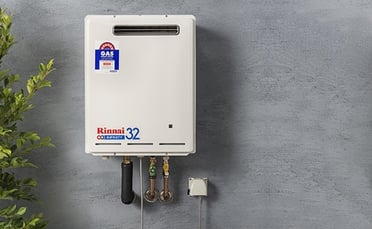Many homes in Victoria are still reliant on electric systems, but it’s far from the only option. Solar, heat pumps, and gas can all provide all the hot water you need. Of course, they won’t all do it in the same way – or for the same price.
In this article, we focus on gas hot water systems, offering a broad view at their pros and cons to help you understand which system is right for you.
How do gas water heaters work?
But first, let’s talk a bit more about how these systems actually work. They come in two types – just like electric systems – either storage or instantaneous. Both of these systems rely on a gas burner, with the same principle as ones you’d be familiar with from stovetops and ovens.
You’ll either need to order LPG bottles or have an existing gas connection to your home. Remembering to order LPG bottles and manually changing them out can be a frustrating hassle and is less than ideal. Not to mention, you can expect regular price increases. Fortunately, if you live in Victoria, you’re likely to have a gas connection.
We’ve long relied on gas for all sorts of home heating, as Victoria has historically had plentiful supplies in the Bass Strait. Having this large gas supply right near Melbourne means Victorians use much more gas than the other states, and it’s typical for a house to have a connection.
Storage systems have a large tank that they heat to a certain temperature. It’ll stay around that temperature over the day, but needs to be refilled when you use water. On top of that, despite the tank’s insulation, some heat is lost to the outside air in what’s called “standing losses.” This means the burner has to switch back on throughout the day to keep the water adequately heated, preventing the growth of legionella and other bacteria.
With an instant system, a burner heats the water as it travels through the pipe. That means you won’t run out of hot water through heavy use, like you might with a storage system. You do need a higher flow, 20mm rather than 15, as you use more gas when the system is operating – but it’s less overall.
With that out of the way, let’s talk about the good stuff.
The pros of gas hot water systems
People who switch to gas for hot water are typically coming over after having an electric system. That’s because, for homes that already have the connection, gas has historically been cheaper than electricity. That means you can run most gas systems for a considerably lower ongoing cost than a traditional electric system.
However, we should take a moment here to warn that there’s no guarantee this will go on forever. That reserve in the Bass Strait is running out, meaning gas is becoming progressively more expensive. It’s likely gas hot water systems will become less economical with time.

That said, they’re still a better option than electric heaters for the time being. And, while usually more expensive to buy and install than electric systems, they don’t cost a whole lot more.
Another perk is that, unlike electricity, the price of gas doesn’t vary throughout the day. If you’re on a variable electricity plan, you might have to work around when you use hot water to try and get the best deal. With gas, that’s not a consideration. No matter when you use it, you’ll pay the same.
Unlike all other hot water systems, gas systems are required to come with an energy efficiency label. This label includes a star rating up to seven, but also tells you how much gas the system would use annually to heat 200L a day. This makes it incredibly easy to compare systems and find which would cost the least to run.
Storage systems tend to max out at around four to five stars, but instant systems can go all the way up to seven. For a while, a seven star gas system was one of the most efficient ways to heat your water – though in many ways they’re now outpaced by heat pumps.
Cons of gas hot water
At the end of the day, while you’re paying less than an electric system, you are still using a fossil fuel. An efficient system reduces the environmental impact of that, but it doesn’t eliminate it entirely.
As mentioned above, gas is subject to the same long-term supply fluctuations as electricity. The reason it’s been so cheap and available – the Bass Strait supply – is now diminishing, and the price of gas is likely to rise.
While it’s unlikely, it’s still possible that your house doesn’t have an existing gas supply. If that’s the case, you’d need to spend a lot of time ordering and changing LPG bottles, which adds a hassle that other systems simply don’t have. If you’re not hooked up to gas already, you’re better off with another system.
If you opt for a storage system, you’ll have to be sure it’s adequately sized for the household. If your tank runs out, you’ll be forced into cold showers until the water can heat up again. And as we also covered before, gas storage systems are still subject to standing losses, which hurts their overall efficiency.
While an electric system can be installed inside or outside, gas systems will typically have to be installed outside. If you choose to have it inside, you’ll need a flue for the exhaust gases.
Conclusion
For quite a long time, gas heaters were the way to go. They cost much less to run than electric systems and were available in very efficient models. However, two recent developments mean they’ve fallen behind:
- Gas has gotten more expensive, and will likely to continue to, as supplies are more restricted.
- Heat pump technology has advanced to the point that you can get dramatically more efficiency from them – without relying on fossil fuels.
It’s less a case of what you should upgrade to, and more a case of if it’s the right time to upgrade. If you need help with that, check out the other articles in our Learning Centre to become a hot water expert.
